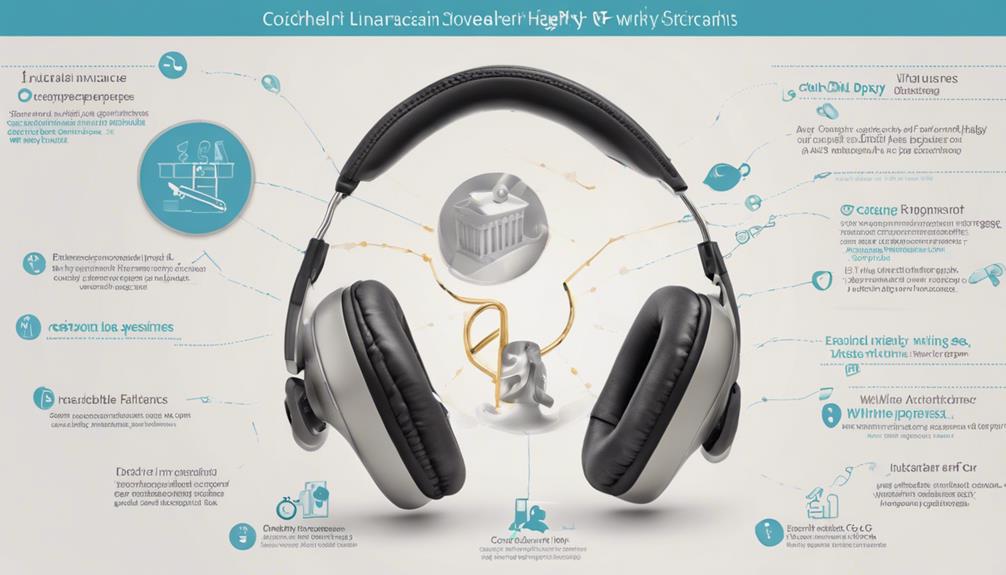Exploring the world of cochlear implant costs and insurance coverage is akin to embarking on a thrilling adventure through a labyrinth, where unraveling the mysteries can be as exciting as uncovering hidden treasures. Find out more about this fascinating journey and unlock the valuable insights waiting for you.
The intricate web of insurance policies, coverage limitations, and out-of-pocket expenses can leave one pondering the true extent of financial predictability in such circumstances.
The journey to unraveling the mysteries of cochlear implant expenses with insurance unveils a landscape influenced by various factors, each holding the key to a different aspect of cost dynamics.
Key Takeaways
- Medicare covers 80% of cochlear implant costs, leaving patients responsible for the remaining 20%.
- Most private insurance plans, Medicaid, and VA programs contribute to covering cochlear implant expenses.
- Understanding insurance nuances like coinsurance, copays, and deductibles is vital for accurate cost estimation.
- Assistance programs are available for those with inadequate insurance coverage, helping to minimize financial responsibilities.

IROGER Hearing Amplifier for Seniors, Personal Sound Amplifier, Smart Auto-Gain, Directional Microphone, Rechargeable with 120-Hour Battery, Headphones & Earbuds Included
Smart Auto-Gain Control – Enjoy crystal-clear sound at all times. iRoger automatically balances audio levels to enhance voices...
As an affiliate, we earn on qualifying purchases.
Understanding Cochlear Implant Costs
How do the costs of cochlear implants vary, and what factors influence these variations?
The total cost of cochlear implants typically falls between $50,000 to $100,000, with insurance coverage playing a crucial role. Private insurance companies, Medicare, and Medicaid generally offer some coverage for cochlear implants, although the extent of coverage can vary. Medicare, for instance, usually covers 80% of the costs for eligible candidates, leaving beneficiaries responsible for the remaining 20% along with potential out-of-pocket expenses like coinsurance, copays, and deductibles.
Factors such as location, insurance coverage specifics, and choosing in-network providers can all influence the final out-of-pocket expenses for individuals receiving cochlear implants. While insurance can help alleviate a significant portion of the costs, there may still be financial responsibilities for the patient. Fortunately, assistance programs exist to support those without adequate insurance coverage, ensuring that individuals can access this vital technology without excessive financial burden.

Neosonic Rechargeable Hearing Amplifier to Aid TV Watching and Conversation, Wireless Neckband Headphones for Seniors & Adults, Remote Microphone Noise Cancelling - NW10 Pro
BACKGROUND NOISE REDUCTION - Equipped with a wireless external microphone, the NW10 Pro allows you to place the...
As an affiliate, we earn on qualifying purchases.
Factors Influencing Cost Coverage

Factors influencing cost coverage for cochlear implants include the type of insurance plan, the location of the individual, and the network status of healthcare providers. When considering insurance coverage for cochlear implants, several key factors come into play:
- Insurance Plan Details: The specifics of the insurance plan, such as coverage percentages, deductibles, and out-of-pocket costs, greatly impact the overall cost coverage for cochlear implants.
- Location: The geographical location of the individual can influence the availability of in-network providers and the cost of services related to cochlear implants.
- Post-Surgery Care: Factors like post-surgery rehabilitation, implant programming, and follow-up care are essential elements that can affect the total cost coverage by insurance.
Understanding these factors is vital for individuals seeking cochlear implants to estimate their out-of-pocket expenses accurately and navigate the complexities of insurance coverage effectively. By considering these aspects, individuals can make informed decisions regarding their implant procedure and associated costs.

IROGER Hearing Amplifier Rechargeable Hearing Device with Standard Headphone Personal Sound Amplifier PSAP for Ears,Seniors,Directional Microphone
Auto Gain Control for Clearer Sound-- Automatically adjusts volume levels to deliver balanced, high-quality sound amplification. Ideal for...
As an affiliate, we earn on qualifying purchases.
Insurance Options for Cochlear Implants
When exploring insurance options for cochlear implants, understanding the coverage provided by private insurance companies, Medicare, and Medicaid is crucial for managing out-of-pocket costs effectively. Most private insurance companies, Medicare, and Medicaid offer coverage for cochlear implants, assisting in reducing patients' expenses. Medicare typically covers 80% of the cost for eligible candidates, with patients responsible for the remaining 20% through coinsurance, copays, and deductibles. Medicare Supplement plans and Medicare Advantage plans can impact coverage details for cochlear implants, providing additional payment options for beneficiaries. Additionally, over 90% of private insurance plans, Medicaid, and Veterans Administration programs contribute to covering the costs associated with cochlear implants, ensuring financial support for patients. Private insurance plans often cover follow-up care extensively, although the specific coverage details and costs may vary based on the insurance provider, plan details, and location.
| Insurance Options | Coverage Details |
|---|---|
| Private Insurance Plans | Vary based on provider, extensive follow-up care coverage, costs may vary |
| Medicare | Typically covers 80%, beneficiaries responsible for 20%, coinsurance, copays, deductibles |
| Medicaid | Assists in covering costs, financial support for patients |
| Medicare Supplement Plans | Alters coverage details, offers additional payment options for beneficiaries |
| Veterans Administration | Contributes to covering costs associated with cochlear implants, ensuring financial support |

yAyusi Wireless Voice Amplifier for Teachers with 2 Magnetic Lavalier Mics, Hands Free Mini Portable Microphone and Speaker with Lanyard, Rechargeable Teacher Microphones for Classroom/Meetings/Speech
【Essential Voice Amplifier Wireless Microphone for Teachers】 Unlike other mini megaphone speaker on the market, our small megaphone...
As an affiliate, we earn on qualifying purchases.
Cost Breakdown With Insurance

Exploring the breakdown of costs with insurance coverage for cochlear implants reveals key financial considerations for patients. When navigating the expenses associated with cochlear implants, understanding the nuances of insurance coverage is essential.
Here is a brief overview of the cost breakdown with insurance:
- Medicare Coverage: Medicare typically covers 80% of the costs for eligible candidates, leaving beneficiaries responsible for the remaining 20%. It's crucial for individuals to comprehend what Medicare will cover and what out-of-pocket expenses may remain.
- Medicaid Coverage: Medicaid, along with most private insurance companies, often covers at least a portion of the total costs associated with cochlear implants. Patients should verify their specific coverage details to anticipate any financial responsibilities.
- Assistance Programs: For those without insurance coverage, various assistance programs exist to help alleviate the financial burden of cochlear implants. These programs can offer vital support in making these life-changing devices more accessible.
Understanding coinsurance, copays, and deductibles in conjunction with insurance coverage is paramount for patients seeking cochlear implants.
Maximizing Insurance Benefits
To optimize insurance benefits for cochlear implant coverage, understanding the nuances of individual plans and available assistance programs is crucial. Medicare typically covers 80% of cochlear implant costs, with beneficiaries responsible for the remaining 20%. Medicare Supplement plans and Medicare Advantage plans can influence coverage details for cochlear implants. Private insurance plans, Medicaid, and the Veterans Administration help cover over 90% of the costs associated with cochlear implants, although coverage specifics can vary based on the provider, plan details, and location.
It's essential to comprehend insurance benefits and costs to maximize coverage for cochlear implant procedures effectively. By familiarizing oneself with the coverage details of different health insurance options and exploring available assistance programs, individuals can ensure they're making informed decisions regarding their hearing health and implant needs. Taking proactive steps to understand insurance benefits can lead to more comprehensive coverage and reduced out-of-pocket costs for cochlear implant recipients.
Frequently Asked Questions
Does Insurance Cover Cochlear Implants?
Insurance typically covers cochlear implants, with most private insurance companies, Medicare, and Medicaid offering some coverage. Medicare often pays 80% for eligible candidates, leaving patients responsible for the remaining 20%.
Additional expenses like coinsurance, copays, and deductibles may apply, but assistance programs are available for those without insurance. Coverage details vary among insurance plans, with private insurance usually offering extensive follow-up care coverage that varies based on the provider, plan, and location.
How Much Do Cochlear Implants Cost in the Us?
Let's delve into the cost of cochlear implants in the US. Prices typically range from $50,000 to $100,000. Factors like location and insurance coverage influence the final cost.
Medicare usually covers 80% for eligible individuals, leaving patients responsible for the remaining 20%. Additional expenses like coinsurance and deductibles might apply. Assistance programs exist for those without insurance.
It's vital to consider these factors when budgeting for a cochlear implant.
How Much Does It Cost to Get a Cochlear Implant With Medicare?
Getting a cochlear implant with Medicare can cost beneficiaries 20% of the Medicare-approved amount, as Medicare typically covers 80% of the expenses.
Additional coverage from Medigap plans can reduce out-of-pocket costs.
Medicare Advantage plans may offer different coverage options for cochlear implants.
This financial assistance provided by Medicare is crucial for individuals who need cochlear implants.
Do Cochlear Implants Give 100% Hearing?
Cochlear implants don't provide 100% hearing restoration. They vary in the level of hearing improvement based on individual factors.
These implants can significantly enhance understanding of speech in quiet settings and improve communication abilities. While not replicating natural hearing, they grant access to sounds, elevating the quality of life for those with severe to profound hearing loss.
Conclusion
In conclusion, the cost of cochlear implants with insurance coverage can vary greatly, but it's generally a significant financial investment.
One interesting statistic to consider is that Medicare typically covers 80% of the costs for eligible candidates, leaving beneficiaries responsible for the remaining 20%.
Understanding the factors influencing cost coverage and maximizing insurance benefits can help individuals navigate the expenses associated with cochlear implants.










